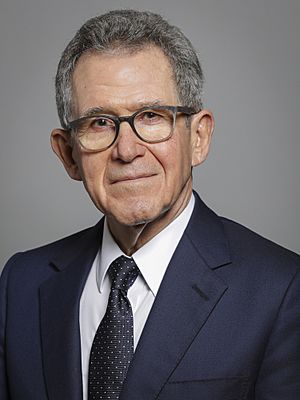John Browne, Baron Browne of Madingley facts for kids
Quick facts for kids
The Lord Browne of Madingley
|
|
|---|---|

Official portrait, 2019
|
|
| Chief Executive Officer of BP | |
| In office 1995–2007 |
|
| Preceded by | David Simon |
| Succeeded by | Tony Hayward |
| Personal details | |
| Born |
Edmund John Phillip Browne
20 February 1948 Hamburg, Germany |
| Political party | None (crossbench) |
| Education | The King's School, Ely |
| Alma mater | |
| Occupation | Executive Chairman of L1 Energy, Past President of the Royal Academy of Engineering, Author, Member of the House of Lords |
Edmund John Phillip Browne, Baron Browne of Madingley (born 20 February 1948), is a British businessman. He is also a member of the House of Lords, which is part of the UK Parliament. He sits as a "crossbencher," meaning he doesn't belong to a specific political party.
Lord Browne was the chief executive (CEO) of BP, a major energy company, from 1995 to 2007. This time was seen as a period of big growth for BP. During his leadership, BP joined with other companies like Amoco and ARCO. He also helped BP get access to oil in Russia by creating TNK-BP.
People called him the "Sun King" because of his strong leadership style. He was praised for changing how the oil and gas industry thought about climate change. He also helped BP start a business focused on renewable energy and other new energy sources. He left BP in May 2007.
Lord Browne was the president of the Royal Academy of Engineering from 2006 to 2011. He has also been on the boards of big companies like Goldman Sachs, Intel, and Daimler Benz. He became a member of the House of Lords in 2001. He was also a partner at Riverstone Holdings, where he helped manage a fund for renewable energy projects. He studied at the University of Cambridge and Stanford University. In 2025, Lord Browne was a candidate to become the Chancellor of the University of Cambridge.
Contents
Early Life and Education
Lord Browne was born on 20 February 1948 in Hamburg, Germany. His father was a British Army officer who later worked for the company that became British Petroleum (BP). His mother, Paula, was a Hungarian Jewish person who survived Auschwitz. Many of his mother's family members, including his grandparents, died during The Holocaust.
He went to The King's School (now King's Ely) and St John's College, Cambridge. There, he earned a top degree in physics. He also has a master's degree in business from Stanford University in California.
Career at BP
Lord Browne joined BP as an apprentice in 1966 while he was still at university. His father suggested he join the company. He stayed with BP for his entire career.
From 1969 to 1983, he worked in different roles related to finding and producing oil and gas. These jobs took him to places like Alaska, New York, London, and Canada. In 1984, he became the company's treasurer. In 1986, he moved to Cleveland, Ohio, to work for Standard Oil of Ohio. After BP and Standard Oil merged in 1987, he became the chief executive of Standard Oil Production Company. In 1989, he became a managing director of BP Exploration in London. He joined BP's main board in 1991.
He became the group chief executive of BP on 10 June 1995. This happened after the British government sold its last shares in the company. After BP and Amoco merged, he became the chief executive of the new combined company on 31 December 1998. He held this role until 1 May 2007. He was one of the highest-paid executives in the UK.
From 1997, Lord Browne worked to give BP a new image. The company started to connect itself with environmental issues. They used the slogan "Beyond Petroleum" to link BP's initials with a focus on new energy. Lord Browne said that companies should find ways to meet energy needs without harming the environment too much. He also wanted to develop more sustainable energy sources for the future. He promised that BP would cut its own CO2 emissions by 10% by 2010. They reached this goal nine years early.
Leaving BP
It was announced on 25 July 2006 that Lord Browne would step down as BP's chief executive in December 2008. His retirement date was later moved forward to July 2007. Tony Hayward took over as CEO. Lord Browne resigned from BP on 1 May 2007. He also resigned as a non-executive director of Goldman Sachs on 10 May 2007.
Lord Browne stated that he had always kept his private life separate from his work. He expressed disappointment that certain information about his personal life was made public.
Later Career and Other Activities
In October 2010, Lord Browne became chairman of the advisory board at Stanhope Capital. This company manages money for charities and other organizations.
Lord Browne also worked as Chairman of Cuadrilla Resources in the early 2010s. This company is involved in fracking. He was also a managing partner at Riverstone Holdings, which invested in Cuadrilla.
In 2015, Lord Browne left Cuadrilla to become the executive chairman of L1 Energy. This is an oil and gas company supported by Russian billionaire Mikhail Fridman. In 2019, Lord Browne said that fracking in the UK "doesn't make much sense."
In 2025, Lord Browne ran for Chancellor of the University of Cambridge. Some academics argued that he was not the right person for the role. They pointed to his past work in the oil and gas industry.
Other Important Roles
Lord Browne was president of the Royal Academy of Engineering from 2006 to 2011. He was made a Fellow of the Royal Society in 2006. In 1998, Queen Elizabeth II made him a knight. In 2001, he became a "people's peer" in the House of Lords. This means he was chosen to join the House of Lords for his achievements. He took the title Baron Browne of Madingley.
He became a trustee of the Tate Gallery in 2007 and its chairman in 2009. In 2009, he was asked to lead a review into university tuition fees in the UK. His report was published in October 2010. In 2010, he was also appointed as the Government's lead non-executive director. His job was to help recruit business leaders for government departments.
He is chairman of the advisory board for the Blavatnik School of Government at the University of Oxford. He also chairs the trustees of the Queen Elizabeth Prize for Engineering. He is chairman of the Francis Crick Institute, a major research center. He also chairs the Donmar Warehouse Theatre and the Courtauld Institute of Art. He is a trustee of the Holocaust Educational Trust.
Lord Browne is on the boards of IHS Markit and SparkCognition. He is also an advisor for companies like Edelman and Schillings. From 2015 to 2020, he was the non-executive chairman of Huawei UK.
He founded and chairs the John Browne Charitable Trust. This trust helps people with great potential, especially those from backgrounds that are not often represented. The trust has given out over £2 million in the last 20 years.
In 2021, Lord Browne joined General Atlantic as a senior advisor. He also co-founded and chairs BeyondNetZero. This is a company that invests in businesses that offer solutions to climate change.
From 2015 to 2021, Lord Browne was executive chairman of L1 Energy. In 2017, he helped create a new company called Wintershall Dea. This company was formed by combining the oil and gas businesses of L1 Energy and BASF. Lord Browne now chairs the supervisory board of Wintershall Dea.
He was the UK Government's lead non-executive director until January 2015. In April 2021, he became co-Chairman of the Prime Minister's Council on Science and Technology.
The Browne Review on University Fees
In October 2010, Lord Browne's report on university tuition fees was published. It was called Securing a Sustainable Future for Higher Education. The main idea of the report was that universities should be able to decide their own tuition fees.
Personal Interests
Lord Browne enjoys 17th and 18th-century Italian books with pictures. He also likes pre-Columbian art, modern art, music, opera, and theatre.
He lives in Chelsea, London. His home was designed by Tim Gosling.
Lord Browne has received many honors and awards. He is a Fellow of the Royal Academy of Engineering and the Royal Society. He has also received honorary doctorates from many universities around the world. In 1999, he received the Prince Philip Medal for his important work in engineering. In 2000, he received the Golden Plate Award from the American Academy of Achievement.
Images for kids



